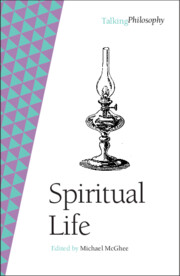Book contents
- Spiritual Life
- Talking Philosophy
- Spiritual Life
- Copyright page
- Contents
- Contributors
- Preface
- Introduction
- 1 Philosophy and Religion in the Thought of Kierkegaard
- 2 De Consolatione Philosophiae
- 3 The real or the Real? Chardin or Rothko?
- 4 Love and Attention
- 5 Descartes’ Debt to Augustine
- 6 Visions of the Self in Late Medieval Christianity: Some Cross-Disciplinary Reflections
- 7 Refined and Crass Supernaturalism
- 8 Religious Imagination
- 9 Moral Values as Religious Absolutes
- 10 Revealing the Scapegoat Mechanism: Christianity after Girard
- 11 Philosophy vs. Mysticism: An Islamic Controversy
- 12 Non-Conceptuality, Critical Reasoning and Religious Experience: Some Tibetan Buddhist Discussions
- 13 ‘Know Thyself’: What Kind of an Injunction?
- 14 Facing Truths: Ethics and the Spiritual Life
- Index
- References
13 - ‘Know Thyself’: What Kind of an Injunction?
Published online by Cambridge University Press: 18 April 2024
- Spiritual Life
- Talking Philosophy
- Spiritual Life
- Copyright page
- Contents
- Contributors
- Preface
- Introduction
- 1 Philosophy and Religion in the Thought of Kierkegaard
- 2 De Consolatione Philosophiae
- 3 The real or the Real? Chardin or Rothko?
- 4 Love and Attention
- 5 Descartes’ Debt to Augustine
- 6 Visions of the Self in Late Medieval Christianity: Some Cross-Disciplinary Reflections
- 7 Refined and Crass Supernaturalism
- 8 Religious Imagination
- 9 Moral Values as Religious Absolutes
- 10 Revealing the Scapegoat Mechanism: Christianity after Girard
- 11 Philosophy vs. Mysticism: An Islamic Controversy
- 12 Non-Conceptuality, Critical Reasoning and Religious Experience: Some Tibetan Buddhist Discussions
- 13 ‘Know Thyself’: What Kind of an Injunction?
- 14 Facing Truths: Ethics and the Spiritual Life
- Index
- References
Summary
To be told, ‘know thyself’ is to be told that I don’t know myself yet: it carries the assumption that I am in some sense distracted from what or who I actually am, that I am in error or at least ignorance about myself. It thus further suggests that my habitual stresses, confusions and frustrations are substantially the result of failure or inability to see what is most profoundly true of me: the complex character of my injuries or traumas, the distinctive potential given me by my history and temperament. I conceal my true feelings from my knowing self; I am content to accept the ways in which other people define me, and so fail to ‘take my own authority’ and decide for myself who or what I shall be.
- Type
- Chapter
- Information
- Spiritual Life , pp. 344 - 371Publisher: Cambridge University PressPrint publication year: 2024

